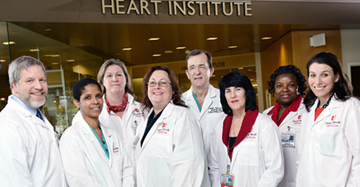Stony Brook University Heart Institute's VAD Program Earns Joint Commission Reaccreditation
First Accredited VAD Program on Long Island Reaccredited for Two Years
STONY BROOK, NY, February 27, 2013 — Stony Brook University Heart Institute's Ventricular Assist Device (VAD) program has earned reaccreditation from The Joint Commission after an intensive two-day review. The two-year reaccreditation extends from January 31, 2013, through January 31, 2015.
Stony Brook was the first hospital on Long Island to implant a HeartMate II VAD device in 2010 and became the first accredited VAD program on Long Island in 2011. To date, 20 patients have received VADs, which are surgically implanted, electrically (battery) powered pumps that help a failing heart's left ventricle pump adequate amounts of blood to the body.
"Accreditation signifies that our program provides safe, high-quality care for patients with heart failure," said Kenneth Kaushansky, MD, Senior Vice President, Health Sciences, and Dean, Stony Brook University School of Medicine. "It is a seal of approval that signals to patients that they are in capable hands when they come to Stony Brook Medicine."
 Members of the Stony Brook University Heart Institute's Ventricular Assist Device (VAD) team include, left to right: Hal Skopicki, MD, PhD, Co-Director of the VAD Program; Allison J. McLarty, MD, Surgical Co-Director of the VAD program; Ellen McCarty-Santoro, MSN, CANP, Nurse Practitioner with the Heart Failure Program; Kathleen Lopez-Newton, MSN, NP, VAD Coordinator; James R. Taylor Jr., MD, Co-Director of the Stony Brook University Heart Institute; Kathryn Scheriff, RN, MSN, CNOR, Interim Associate Director of Nursing for the Heart Institute; Fola Akande, BSN, CNS, FNP-C, Nurse Practitioner with the Heart Failure Program; and Michelle Bloom, MD, Director of Outpatient Services for the Heart Failure Program.
Members of the Stony Brook University Heart Institute's Ventricular Assist Device (VAD) team include, left to right: Hal Skopicki, MD, PhD, Co-Director of the VAD Program; Allison J. McLarty, MD, Surgical Co-Director of the VAD program; Ellen McCarty-Santoro, MSN, CANP, Nurse Practitioner with the Heart Failure Program; Kathleen Lopez-Newton, MSN, NP, VAD Coordinator; James R. Taylor Jr., MD, Co-Director of the Stony Brook University Heart Institute; Kathryn Scheriff, RN, MSN, CNOR, Interim Associate Director of Nursing for the Heart Institute; Fola Akande, BSN, CNS, FNP-C, Nurse Practitioner with the Heart Failure Program; and Michelle Bloom, MD, Director of Outpatient Services for the Heart Failure Program.
VAD is considered "destination therapy" as the final treatment option for select patients whose hearts require mechanical assistance to pump blood. It is also used as a bridge to heart transplantation in patients with heart failure or other incurable heart conditions.
"This achievement demonstrates the high quality of care we deliver to our patients and our expertise at providing the highest levels of care for patients with advanced heart failure," said Reuven Pasternak, MD, Chief Executive Officer, Stony Brook University Hospital, and Vice President for Health Systems, Stony Brook Medicine.
"Accreditation confirms our Heart team's superb clinical practice," said Allison J. McLarty, MD, Surgical Co-Director of the VAD program. "The Joint Commission singled out Stony Brook for its care and commitment to advanced cardiac heart failure patients and for maintaining the highest standards of care... The surveyor was thoroughly impressed with the level of knowledge our nurses and operating room team demonstrated."
Hal Skopicki, MD, PhD, Director of the Heart Failure and Cardiomyopathy Program at Stony Brook University Hospital and Co-Director of the VAD Program, said the success of Stony Brook's VAD program is the result of a joint effort by a large network of cardiologists on Long Island, combined with Stony Brook's multidisciplinary treatment team - including gastroenterologists, pulmonologists, nephrologists, infectious disease specialists, psychiatrists and hematology/oncologists. "Together, we marshal our efforts to create excellent outcomes for our patients," he said.
"Our successful review by The Joint Commission reflects a total team commitment to providing quality care to patients requiring ventricular assist devices," said Margaret Duffy, MS, RN, NEA-BC, Interim Chief Nursing Officer and Associate Director of Nursing for Cardiac Services at Stony Brook University Hospital.
VAD Coordinator Kathleen Lopez-Newton, NP, provides surgical and medical management of patients to allow for their intricate care. "Watching patients transform from end-stage heart failure patients with severe breathing challenges and limited energy levels to vibrant, interactive members of their communities is the greatest reward you can imagine in medicine" Lopez-Newton said. "To be part of their journey from sickness to active family members, parents, grandparents, sisters and brothers...it is truly amazing."
To achieve accreditation, VAD programs are evaluated on standards in The Joint Commission's Disease-Specific Care Certification Manual. Programs must demonstrate conformity with clinical practice guidelines or evidence-based practices. They are also required to collect and analyze data on at least four performance measures related to clinical practice guidelines until more standardized performance measures are identified.
Accredited programs must also:
- Provide VAD destination therapy to an adult population
- Have facilities with the infrastructure to support VAD placement, including adequate staffing and facilities to perform and recover patients after cardiac surgery
- Be an active continuous member of a national, audited registry for mechanically assisted circulatory support devices that requires submission of health data on ventricular assist device destination therapy patients from the date of implantation throughout the remainder of their lives
- Include a board-certified cardiac surgeon has placed 10 VADs in the past 36 months with current activity in the past 12 months.

